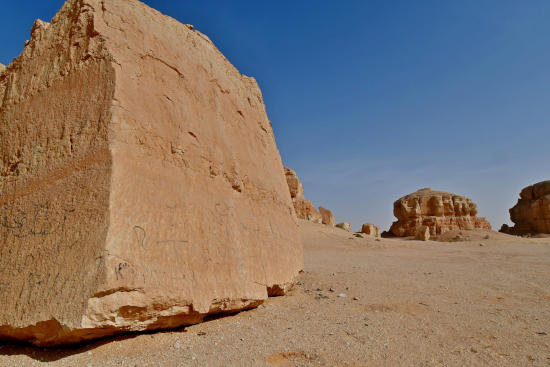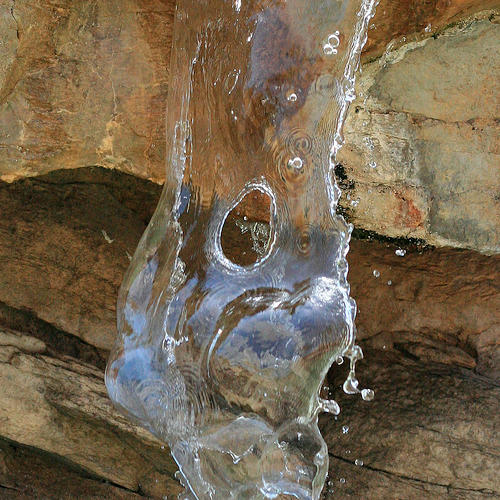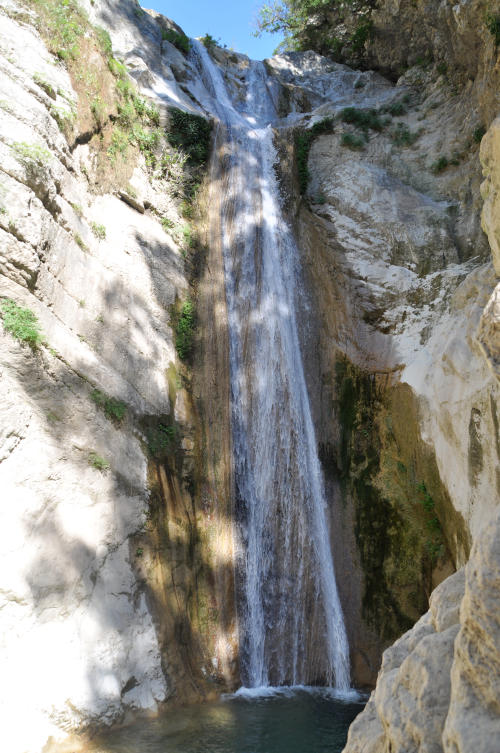A Pepper Grinder Post
Water from the Rock
There are some Bible passages that are baffling because it is hard to understand what the passage is saying. There are others that are confusing because, although what is being said is quite clear, we are left in the dark about WHY things happened as they did. The passage I studied for this post falls into the second category. Here is my translation of Numbers 20:1-12:
The whole Israelite community arrived at the Desert of Zin in the first month, and they stayed at Kadesh. Miriam died and was buried there.
There was no water for the community, and the people gathered to confront Moses and Aaron. The people argued with Moses, saying, "If only we had died when our brothers died in Yahweh’s presence. Why did you bring Yahweh’s community to this desert? So we and our cattle would die? Why did you bring us up from Egypt to this evil place? There is no grain, no figs, no grapevines, and no pomegranates. There is no water to drink."
Moses and Aaron left the assembly, went to the entrance of the Tent of Meeting, and fell facedown, and the glory of Yahweh appeared to them. Yahweh said to Moses, "Take the staff, and you and Aaron your brother call the community together. Speak to the rock in front of them and it will pour out its water. Water will come out of it for them, and both the community and your animals will drink.
So Moses took the staff from the presence of Yahweh just as he had commanded him. Moses and Aaron gathered the community in front of the rock and said, "Listen now, you rebels! Do we have to bring water out of this rock for you?" Then Moses lifted his hand, and hit the rock twice with his staff. A great deal of water came out, and the community and their animals drank.
But Yahweh said to Moses and Aaron, "Because you didn’t believe in me enough to treat me as holy in front of the children of Israel, you won’t lead this community into the land I’m giving them."
 Huh? God tells Moses and Aaron to bring water out of the rock, and they go and do it. And then God is so angry with them that he tells them they can’t lead the people into the Promised Land?? And what in the world does he mean when he says they didn’t believe in him enough to treat him as holy?
Huh? God tells Moses and Aaron to bring water out of the rock, and they go and do it. And then God is so angry with them that he tells them they can’t lead the people into the Promised Land?? And what in the world does he mean when he says they didn’t believe in him enough to treat him as holy?
Let’s start by setting the stage. This was not a very encouraging time. The people had been in the desert for a long time. God provided for them, but it still cannot have been an especially fun experience. They drank water, when they could get it, and they ate manna. Imagine your favorite kind of cracker. Personally, I would vote for Triscuits. Now imagine that you wake up one morning to find your yard covered with them. You might be pretty pleased. But now imagine that you have no other food to eat. Triscuits and water, day after day, year after year. Blech!
To top it off, the Israelites had recently blown their chance to go into the Promised Land and return to a normal diet. They got discouraged when the men sent to spy out the country told them about the powerful people inhabiting the land. They rebelled against God, and Moses had only stopped God from destroying the people by pleading with him to spare them (just as he had after they worshipped the golden calf). The sentence pronounced on the people: forty more years in the desert, living on Triscuits and water!
Then chapter 20 starts out with the death of Miriam. Although Moses, Aaron, and Miriam didn’t always have a perfect relationship, they were siblings, and it must often have felt like it was the three of them against the world. The Bible, in the understated way it often reports this type of thing, just states that she died and was buried, but this has to have been a blow for Moses and Aaron.
And now they have no water. I’m not sure I can even imagine what it would be like to have no water. I have lived my entire life having only to walk to the sink and turn a faucet to get as much water as I want, as well as having plenty of other delicious things to drink. To make it even worse, the Israelites were herdsmen. Their main source of wealth and clothing, as well as a good chunk of their food, came from their animals. Without water, it wouldn’t be long until these animals started dropping like flies. And they needed LOTS of water. There were around 600,000 men along with their wives, children, and animals.
To sum it up, things were not going so well.
But now God has come to the aid of his people. He has brought water out of a desert rock (or cliff—the Hebrew word could mean either). Yet somehow, even this triumph has turned into a disaster for Moses and Aaron. What did they do wrong?
Some people have proposed a simple answer to this question. They point out that Yahweh commanded Moses and Aaron to speak to the rock, and it would pour out water. Instead, Moses (presumably through Aaron, his spokesperson) yelled at the people and then hit the rock twice with his staff. The point is made that when the God of the universe has given you an explicit command, you had better do exactly what he says.
To an extent, I would agree with this 100%. If God were to appear to me and tell me clearly to wear a red shirt, I would want to find the reddest shirt I had and put that on. I wouldn’t mess around with maroon or rust—I would want to do precisely what he said.
 And yet, there is something missing with this explanation. For one thing, we are not dealing with a God whose greatest pleasure comes from minute obedience for the sake of minute obedience. This is the God who chose to make Jacob, a guy who could swindle a used-car salesman out of his life savings, the father of his chosen people. This is the God who called David, a murderer and adulterer, a "man after my own heart." I am not saying that obedience doesn’t matter to God. I think that obedience out of love for God is delightful to him. But we cannot read about Jesus and the Pharisees and not see that obedience not coming from love for God does not please him. This makes me think that for God to be angry enough with Moses, his chosen deliverer, to refuse him entry into the Promised Land, there has to have been something going on besides a failure to follow instructions precisely enough.
And yet, there is something missing with this explanation. For one thing, we are not dealing with a God whose greatest pleasure comes from minute obedience for the sake of minute obedience. This is the God who chose to make Jacob, a guy who could swindle a used-car salesman out of his life savings, the father of his chosen people. This is the God who called David, a murderer and adulterer, a "man after my own heart." I am not saying that obedience doesn’t matter to God. I think that obedience out of love for God is delightful to him. But we cannot read about Jesus and the Pharisees and not see that obedience not coming from love for God does not please him. This makes me think that for God to be angry enough with Moses, his chosen deliverer, to refuse him entry into the Promised Land, there has to have been something going on besides a failure to follow instructions precisely enough.
But how are we supposed to figure out what it was that Moses and Aaron did? The good news is that God tells them in this passage. The bad news is that it is not very clear at first glance what he is really saying. He says, "Because you didn’t believe in me enough to treat me as holy in front of the children of Israel, you won’t lead this community into the land I’m giving them."
My first question is what God means when he says they didn’t treat him as holy. You may remember that "holy" is a very rich word, meaning much more than just "really good." It conveys the idea that although we were made in God’s likeness, he is very, very far above us in power, in wisdom, in knowledge, and in purity. He is DIFFERENT from us—VERY DIFFERENT. I could see that if Moses and Aaron had gotten up there and done a stand-up comedy routine about the things God had done for his people, that could have been offensive, but they didn’t say a single word about God.
Hmm. They didn’t say a single word about God. Could this be part of the problem? They could have said something like, "You people are ungrateful jerks, but because God is loving, patient, and merciful, he is going to use his mighty power to give you, your families, and even your animals water to drink from this rock." Instead they said, "Listen now, you rebels! Do we have to bring water out of this rock for you?" Notice especially who is producing the water in the Moses and Aaron version. God’s mercy and power are two of the things that make him HOLY (i.e. different). But Moses and Aaron have given up the opportunity to show God’s holiness, and instead sound like they are using his miracle to aggrandize themselves.
That part makes pretty good sense to me, but God says they didn’t trust (or believe in) him enough to treat him as holy. How does what they did show a lack of trust? I would personally be pretty nervous about standing in front of a million plus people and making water come out of a rock in the desert. It seems like that would take a fair amount of trust.
I cannot prove this, but I don’t think their problem was a lack of trust that God could miraculously give his people water. I think the lack of trust from which Moses and Aaron suffered was a doubt that God would do anything good for them.
It makes sense, if you think about it. What good has come out of the Exodus for them? They are the leader and high priest of a people who seem to be constantly teetering on the edge of rebelling against them as well as Yahweh. They are subsisting on manna and water just like everyone else. As mentioned before, their sister has recently died. It doesn’t seem so strange that they would feel kind of fed up. If they do everything just right and give credit to the Lord and speak graciously and maintain the right attitude, they probably thought things would turn out well….for now. But they have to have known that in a few days or weeks, the people would be grumbling again. In a frame of mind like that, it isn’t hard for me to imagine Aaron lashing out with angry words and Moses giving the rock a couple of whacks.
 There are a couple of lessons I take from this. For one thing, even though Moses and Aaron had messed up, God still made the water come out. He cared about the fact that those grumbling, ungrateful people of his were thirsty. I think this explains something about situations where people are shocked and saddened to hear that their powerful preacher or favorite worship leader has been doing something like cheating on his wife. We may think, "But the Lord really seemed to be using him." Maybe the Lord was. He used Sampson, even though he had the morals and self-control of an alley cat. As with Moses and Aaron, I think our disobedience will hurt us, but it will not stop God from doing what God plans to do.
There are a couple of lessons I take from this. For one thing, even though Moses and Aaron had messed up, God still made the water come out. He cared about the fact that those grumbling, ungrateful people of his were thirsty. I think this explains something about situations where people are shocked and saddened to hear that their powerful preacher or favorite worship leader has been doing something like cheating on his wife. We may think, "But the Lord really seemed to be using him." Maybe the Lord was. He used Sampson, even though he had the morals and self-control of an alley cat. As with Moses and Aaron, I think our disobedience will hurt us, but it will not stop God from doing what God plans to do.
The other lesson I take away is that we have to not give up. There will times when we will feel that what we do makes no difference. "My boss never notices when I do something right." "My husband doesn’t even seem to taste the food I cook." "My kids don’t appreciate all the stuff I do for them." "No one reads my blog." __________ (Fill in the blank with your own expression of discouragement.) It often seems to me that I feel the most discouraged when something good is about to happen. But even if not, giving in to that discouragement and acting on it is only going to end up hurting us.
Moses and Aaron may have wanted to lash out at the people, but I believe that even if the Israelites felt a little chagrined or frightened by the words and deeds of their leaders, those feelings were forgotten when that cool, gushing water touched their lips. But Moses and Aaron were deprived of reaching the goal that they had been heading toward for many years.
Does this mean that God rejected Moses and Aaron? Certainly not! Moses was still one of the three people who appeared and spoke with Jesus at the Transfiguration. God didn’t stop loving them, but they lost something that was very important to them.
If Moses were here, I believe he would tell us not to give up. We need to keep going. We need to keep doing what we know God has called us to do, in the way he has called us to do it. We need to keep acknowledging that our gifts ARE gifts and not something we can take credit for. We need to remember that our deliverer is coming, and his reward is with him.
- Pepper
Posted 2020-11-25
*Image Credits: Rock in the desert by Savvas Stavrinos, water flowing down rock from fortywaters.com, waterfall by Golin Doorneweerd.
